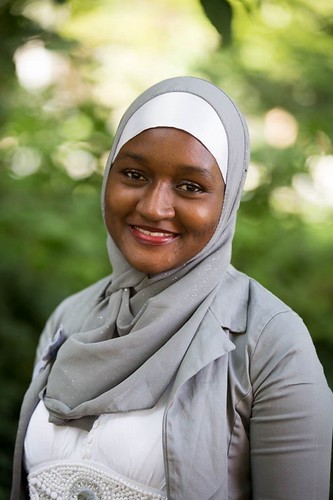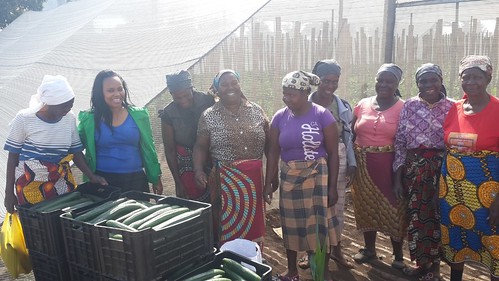
Every month, USDA shares stories of women in agriculture who are leading the industry and helping other women succeed along the way. We hear from two young ladies this month, Aissata Abdou from Niger and Marcia Maposse from Mozambique, who were recipients of the prestigious Mandela Washington Fellowship of the Young African Leaders Initiative. They were additionally selected to participate in the fellowship’s 6-week Professional Development Experience which they just completed at Penn State Extension and USDA’s Michigan Rural Development Office in Traverse City respectively.
Aissata Abdou is an agricultural economist from Niger specializing in social and economic development. She works for the office of the Prime Minister in the capital city of Niamey. In her role at the Public Policies Analysis and Government Action Assessment division, she assesses governmental policies and leads prospective research in agriculture and livestock production.
Can you share your story with us?
My name is Aissata and I was born in Agadez in Niger in 1990. I grew up traveling around the country because my parents had to move from time to time. I use to spend my holidays in rural areas in Niger and I would follow my grand-mother to her farm in Tahoua. By spending time in rural areas, I realized how dependent my people are to agriculture. I noticed how some households around the villages struggled to get access to food. I wanted to improve their living conditions and that is why I decided to work in agriculture. After graduating high school, I got a scholarship to study in one of the most prestigious universities for life sciences in Africa: The Agronomic and Veterinary Institute Hassan II in Rabat (Morocco). After graduating college, I got the privilege to work in Niger Prime Minister office. In my role at the Public Policies Analysis and Government Action Assessment division (CAPEG), I assess governmental policies and lead prospective research to advocate for better agricultural policies. I am also involved in women empowerment issues in rural areas through a volunteer work with Annouri NGO.
What does Agriculture mean to you?
To me, agriculture is the key to develop Niger. We need to feed our people and participate in the regional and global economics. Niger is a Sahelian country in the middle of Sahara Desert. Therefore, lack of rainfall and soil poverty are among our biggest challenges in agricultural production. When we look at some specific agricultural global value chains we can see how weak the position of the country is even in regional context. Niger's economy is heavily dependent on agriculture. Forty-one percent of the country's gross domestic product is derived from agriculture and livestock production, and up to 80 percent of the population is involved in the sector. Agriculture is the sector to develop in order to get Niger’s citizens out of poverty.
What personal challenges have you encountered as a woman in ag? How did you overcome them?
Any kind of job is a challenge for women in Niger because according to our culture women are the ones in charge of the house chores. It is very difficult to combine job and family. I knew I would face these challenges, so I clearly explained to my partner my career ambitions and constraints before we got married. My husband is easy going and I can count on him when I am not home. I can also count on my mom who is also happy to keep my young son. That way, I can focus on my work.
Where do you see yourself in five, ten and twenty years and how do you hope to get there?
I think I still have a lot to achieve in Niger. This is just the beginning of my commitment to participate in the development of agriculture in my country. I want to serve my country first. Since the independence of Niger in 1960, a lot of policies have targeted agricultural development, but the sector still suffers from low productivity and the population is vulnerable to food insecurity. I would like to focus on establishing strong and sustainable public policies with a very high impact on agricultural productivity within the next 10 years. By working hard, I can influence decision making in agricultural policies.

Márcia Maposse is an agribusiness entrepreneur who holds a B.S. in Agronomic Engineering. She owns a company called Bindzu Agrobusiness e Consultoria Lda, which operates an agriculture value chain in Mozambique. Her aspiration is to become a well-recognized and influent agribusiness entrepreneur who links farmers to markets and transfers technology to farmers.
Can you share your story with us?
In my childhood, I was always engaged in agricultural activities with my family. Since then, my life's purpose has been to transform agriculture in business activity in Mozambique. After college, three former classmates and I decided to create an agribusiness company called Bindzu Agrobusiness e Consultoria Lda. Initially Bindzu was devoted to production and marketing of vegetables. However, over time, Bindzu denoted some deficiencies in the agricultural value chain, which if tackled could positively improve its performance. We realized that to improve small-scale farmers two aspects were vital: provision of inputs and advice.
Who do you think are the most influential women in agriculture -- past or present?
Actually the most influential women in agriculture is Maria Isabel Andrade.
What personal challenges have you encountered as a woman in ag? How did you overcome them?
My greatest obstacle was to overcome the stereotype that “farming in Mozambique is for old poor people”. When farmers saw young women professionals in agriculture, they were skeptical, wondering what these young urban women were up to growing crops. The neighboring farmers kept testing me and my colleagues and watching whatever we were doing. Fortunately, it turned out to be a good opportunity to expose our innovations. They became impressed by our techniques, knowledge and ideas. So my know-how was able to overcome this obstacle.
From which communities do you receive the most support and what have you learned from them that is the most valuable to you.
I received the most support from Moamba Farmers Association. Once they saw my work and willingness to contribute to improve agriculture performance, they supported my company by hiring the services we provide and also recommended us to different stakeholders.
Where do you see yourself in five, ten and twenty years and how do you hope to get there?
I envision improving the enabling environment for better performance in the value addition and quality standard of agricultural products. Currently, there is no specialization in the value chain segments. The farmers are engaged in all activities, resulting in inefficiencies and losses. A good agribusiness environment will enable the farmers to improve their food security and income, consequently creating incentives for other specialized agribusiness operators to enter the market. Presently, I am involved in programs and projects that seek to: improve the income of producers and establish service centers; and open dialogues between public and private agricultural stakeholders.
What advice do you have for young women interested in agriculture? Or what’s the best bit of advice you’ve gotten from someone?
The best advice I have gotten from someone is never ever give up.

